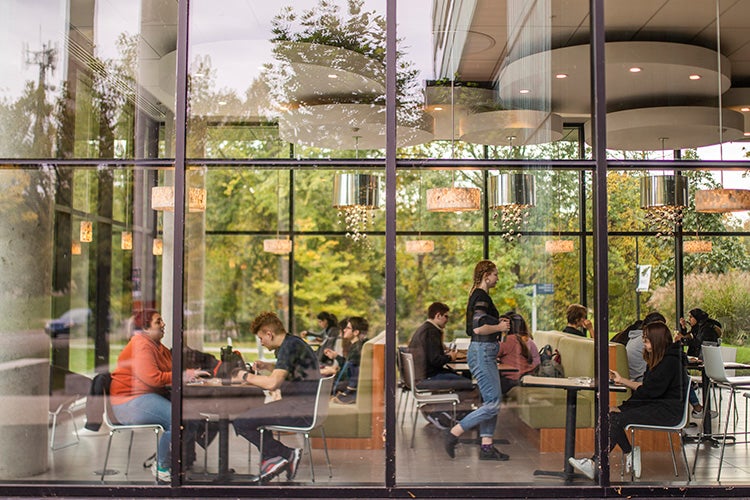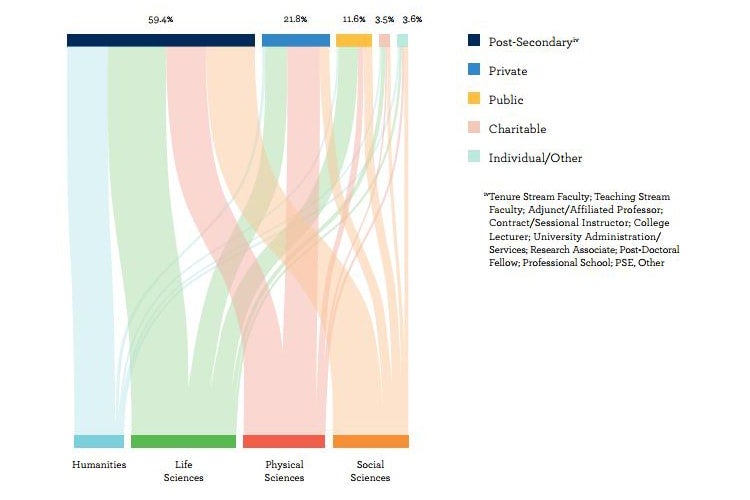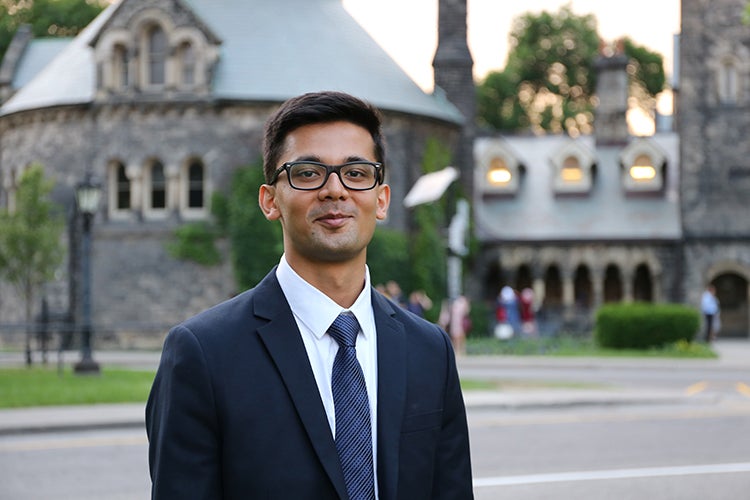In high demand: Why U of T graduates are among the most sought after on the planet

Published: November 20, 2018
When it came to launching a career, Enakshi Shah didn’t need to look far after graduating from the University of Toronto.
Armed with a bachelor’s degree in chemical engineering and a passion for computer programming, Shah packed up her things and moved a few subway stops south of U of T’s downtown Toronto campus to a fast-growing software development firm, where she’s now hammering out code for a who’s who of the corporate world.
“The projects have been great,” says Shah of her new position. “They’re all with Fortune 500 companies – mostly from the States. It’s such a good variety – new Android technology, iOS – right across the board.”
Shah and her family are originally from Peterborough, Ont. But they moved to the United States when she was in Grade 5, ultimately ending up in Orlando, Fla. She and her father, a mechanical engineer, tinkered with car engines in the driveway of the family home. They also took apart toasters and put them back together.
Shah zeroed in on U of T’s Faculty of Applied Science & Engineering when deciding where to attend university – in part because of U of T’s top-notch reputation, but also because of the faculty’s commitment to diversity.
She says her decision to remain in Toronto following graduation last spring was a no-brainer.
“I think it’s going to be the next tech hub in North America,” she says. “I never felt bottlenecked or stymied after I graduated. There were so many opportunities.”
Shah’s experience is an increasingly common one among U of T graduates. Despite dire warnings about a “lost generation” after the Great Recession that followed the 2008 financial crisis, many U of T grads – and even some current students – are suddenly finding themselves in exceptionally high demand, wooed by a wide variety of employers in Toronto and beyond.
Amelia Merrick, U of T’s director of student career exploration and education, says the number of companies registered on U of T’s Career and Co-Curricular Learning Network, an online portal that matches students with jobs, has skyrocketed by 90 per cent over the past three years and now consists of well over 10,000 organizations.
“As a result, we need to be strategic about who we invite to our fairs and on campus for recruitment,” she says.
Merrick attributes the surge in interest to U of T’s unique combination of academic excellence and research prowess spread across a dizzying array of fields, from social sciences and the humanities to law, engineering and medicine – all situated at the heart of one of the world’s most dynamic and multicultural cities.
At the same time, U of T has played a central role in Toronto’s tech boom, which is drawing interest – and investment – from companies across the world and generating scores of local startups. That, in turn, has created strong ties between the university and industry that graduates are exploiting to launch or further their careers.
While some warn demand for local talent in certain high-demand fields could soon outstrip U of T’s capacity to produce it, the flipside is there’s arguably never been a better time to be a U of T student if your goal is to launch an impactful career.
Says Merrick, “Employers recognize us as a world-class institution.”

Anjum Sultana credits U of T's multi-disciplinary focus for preparing her for a management-level job at the YWCA's national office (photo by Nick Iwanyshyn)
U of T was recently ranked first in Canada and 13th in the world for graduate employability by Times Higher Education magazine – a position it held last year. That places U of T in the company of some of the world’s most elite schools.
A similar employability ranking back in September by London-based Quacquarelli Symonds was even more flattering: U of T placed 12th globally, up three spots from the previous year, and seven spots from 2016.
To be sure, the trend can be partly explained by a sizzling North American job market. The U.S. unemployment rate dropped to nearly a half-century low of 3.7 per cent in September, and remained there last month, while recent data from the U.S. Federal Reserve suggested the salaries and benefits paid to workers have begun to creep up as employers compete for talent. In Canada, meanwhile, Canada’s unemployment rate edged down to 5.8 per cent in October, the lowest in 40 years.
But in U of T’s case, national unemployment stats don’t begin to tell the whole story.
The university consistently ranks as Canada's top university and one of the world's top-ranked public institutions. It's also one of just a handful of global universities to rank highly across a wide array of disciplines.
At the same time, U of T has played a key role in establishing Toronto as an emerging hub in the knowledge economy. A recent report by commercial property firm CBRE went so far as to call Toronto as its fourth-ranked technology market in North America ahead of New York, adding the city added more jobs last year than the San Francisco Bay Area, Seattle and Washington, D.C. combined.
Much of the excitement is focused on U of T’s emergence as a hub for artificial intelligence research. That’s particularly the case in the field of deep learning, which aims to mimic the way the human brain learns. The technology, pioneered, in part, by U of T University Professor Emeritus Geoffrey Hinton, is predicted to transform everything from how we drive cars – or, more accurately, the way they drive us – to the way doctors diagnose disease.
It has also prompted some of the world’s biggest companies, from Google to Samsung, to set up or expand research labs in Toronto in a bid to be closer to cutting-edge AI work being done at U of T – and make it easier to woo the university’s most promising graduates.

U of T ranks among the top universities in the world when it comes to the employability of its graduates (photo by Laura Pedersen)
Car-sharing giant Uber’s recent pledge to invest $200 million in a new, Toronto-based engineering lab is an example of a corporate announcement that’s become almost routine in Canada’s largest city over the past two years. Standing in the MaRS Discovery District back in September, Uber CEO Dara Khosrowshahi said the investment would more than double its current 200-person workforce in the city and boost support for an existing self-driving car lab run by computer vision and machine learning expert Raquel Urtasun, an associate professor in U of T’s department of computer science.
“We think it’s going to be one of the biggest and most productive engineering hubs that we have in the world,” Khosrowshahi said.
Other Canadian and multinational firms that have made similar pledges to launch or expand their Toronto operations – often with a connection to U of T – include: Facebook, RBC, LG, Bombardier, Thomson Reuters, Microsoft, Fujitsu and Intel.
There’s been a similar global recognition of Toronto’s growing life sciences sector. In 2016, for example, pharmaceutical giant Bayer and Versant Ventures inked a US$225-million joint venture to create BlueRock Therapeutics in a deal that was among the biggest of its kind. Co-headquartered in Toronto, Boston and New York, BlueRock is an “engineered cell therapy company” that leans heavily on U of T research to create new therapies to treat heart and brain disease.
The same year, health-care giant Johnson & Johnson launched its JLABS life science incubator at the MaRS Discovery District and, in 2015, U of T took steps to establish itself as a centre of regenerative medicine with the help of a $114-million grant from the federal government.
Add in Toronto’s network of renowned research hospitals and the groundbreaking research performed in U of T Mississauga’s Centre for Cancer Stem Cells Therapeutics and others, and it’s no wonder some are touting the region as one North America’s most vibrant health clusters.
Students, meanwhile, are increasingly viewing U of T as not only a place to attain a world-class education, but as a launch pad to a high-paying career.
To take one prominent example: The number of applicants to U of T’s Master of Science in Applied Computing program, which combines coursework with an eight-month internship at local and international technology companies, jumped by 80 per cent last year, according to Matt Medland, the program’s managing director.
Why? With 95 per cent of students going on to work at the companies where they intern, the program has effectively become a ticket to a job – and a great one at that.
“Our program remains unique in the sense that it really bridges academic and industry research,” Medland says, “and it's clear the word on this uniqueness has gotten out.”

Students at U of T Mississauga: In some fields, U of T students are securing jobs well before graduation (photo by Nick Iwanyshyn)
It’s not only U of T-educated software developers and bio-tech engineers who are experiencing similarly heightened demand for their skills.
At U of T’s Rotman School of Management, a full 85 per cent of 2017 graduates found work within three months of graduation. That’s a five per cent increase of over the previous year. After six months, a full 95 per cent were employed.
“We now have the highest placement rate of any Canadian business school ranked by Financial Times,” Zania Mauricette, Rotman’s director, careers, full-time MBA, wrote in the school’s 2017-2018 Employment & Salary Report.
Similarly, the number of graduates from U of T’s Faculty of Law who were still looking for work upon receiving their degrees in 2017 constituted less than two per cent of the total class – a figure that’s been more or less constant since 2013.
Beyond professional schools, a growing number of graduates are leveraging their education and U of T’s myriad of interdisciplinary opportunities to establish themselves in a wide variety of occupations.
Anjum Sultana, for one, graduated from U of T Scarborough four years ago after studying health sciences, psychology and neuroscience. Though initially interested in pursuing a career in the field of global health, she later decided many of the problems she wanted to solve could also be found much closer to home.
So she enrolled in a master’s of public health at U of T’s Dalla Lana School of Public Health and now works as a manager of public policy and strategic communications at the YWCA Canada, the largest women’s services organization in the country.
Her job is a mix of government relations, policy development and strategic communications – a role she says came naturally given her hectic extra-curricular schedule while attending U of T and shortly after graduation. That includes stints as co-chair of a racial health equity conference, co-director of U of T’s Imagine community health initiative and as a junior fellow at the urban-health focused Wellesley Institute.
“Your ability to work across sectors is so important,” Sultana says. “That is exactly what the workforce is like. You don’t only work with people in only one discipline.”
Don’t just take Sultana’s word for it. In its most recent employability rankings, the editors of Times Higher Education noted that more than two thirds of the firms they surveyed cited interdisciplinary or problem-based learning as a “very important measure … more than any other issue.”
Not surprisingly, those U of T graduates who typically complete the most degrees – PhD-holders – are among the most employable grads the university produces.
A study released earlier this year by the School of Graduate Studies tracked more than 10,000 PhD students who graduated between 2000 and 2015 – in all disciplines – and found nearly all of them are ensconced in careers spanning all sectors of the economy, from finance to pharmaceuticals, in Canada and abroad.

The number of PhD-holders from U of T who are working in the private sector jumped to 23 per cent in 2015, compared to 12 per cent at the turn of the century (image courtesy of U of T's School of Graduate Studies)
As one might expect, many U of T PhD-holders opt to stay in academia, where they can contribute to new knowledge and educate future generations. But a growing number are also choosing to work in the corporate sphere. The survey showed 23 per cent of PhDs were employed in the private sector in 2015, compared to just 13 per cent at the turn of the century.
Luc De Nil, the school’s acting dean, says the shifting landscape is being driven by a number of factors. They include the abolishment of mandatory retirement in Ontario in the mid-2000s, which caused fewer academic positions to open up, and a growing realization among PhD students that a career in the private sector needn’t be a Plan B.
“That’s especially the case in many of the sciences, where people often feel there’s so many opportunities in industry that that’s where they want to end up,” De Nil says.
Employers, meanwhile, are doing their part to drive the change. Under increasing investor pressure to “innovate” their businesses, many have ramped up R&D investments in recent years creating more opportunities for researchers.
Plus, PhD-holders simply make for good employees. De Nil recalls chatting with a Volkswagen executive at a recent conference who said he like hiring PhDs because most of them end up in management roles at the carmaker within five years.
“If you have a PhD, it means we know you have identified a difficult problem, you’ve identified how to approach it, you were able to bring it to completion and had some sort of successful outcome,” says De Nil. Put another way: They’re experts in project management.
“That’s a skill that’s required to be successful in the private sector.”
At the other end of the spectrum are U of T students and recent graduates who haven’t necessarily finished their studies, but are nevertheless taking advantage of a hot job market to gain career-oriented work experience as part of their overall education.
Shreyas Upadhyay is an applications engineer at National Instruments, an Austin, Texas-based company that specializes in making automated testing equipment and virtual instrumentation software. He graduated in June with a bachelor’s in computer engineering and immediately decided to move south of the border to Austin to begin working full-time at National, where he did two summer internships.
Though he may ultimately pursue another degree, Upadhyay says he nevertheless jumped at the opportunity to work at National.
“I really enjoyed the company, culture and the work I was doing,” he says. “I had a lot of friends who had a similar experience where they had an offer before even graduating.”

Shreyas Upadhyay, who now works at National Instruments in Austin, Texas, says most of his friends had a job offer before graduation (photo courtesy of Shreyas Upadhyay)
The same goes for Ashley Fiazool – although, in her case, she didn’t need an internship to get her foot in the door.
Four years into her bachelor’s in philosophy, Fiazool managed to secure a job as a marketing co-ordinator at legal services company Blue J Legal, co-founded by U of T law professor Benjamin Alarie. The startup uses machine learning to help determine how a judge might rule in case involving tax or employment law.
The first in her family to attend university, Fiazool says she began looking for work after first year to help pay for her education. But instead of focusing on coffee shops or restaurants, she took advantage of U of T-organized career events and alumni networking opportunities to try and land a job that would ultimately help her get into law school.
“Most people obtain their jobs in any industry after they graduate,” says Fiazool, a student at Woodsworth College. “But I was able to market and sell myself pretty well despite not having my BA yet.”
Fiazool’s early success in the labour market highlights another powerful aspect of attending U of T: its vast network of more than 550,000 alumni spread across the globe.
A recent impact survey conducted by U of T found the university’s graduates have collectively generated US$368 billion each year through the roughly 190,000 companies and non-profit organizations they’ve created. Those ventures, in turn, have contributed to the creation of some 3.7 million jobs, the majority of them in Ontario.
Is Fiazool surprised an AI-powered startup hired a fourth-year philosophy major?
“Philosophy grads think critically, have good analytical skills and can articulate well,” she says. “At the end of the day, those base skills can be applicable to any job out there.”

Ashley Fiazool leveraged her studies in philosophy and self-marketing skills to land a job at a fast-growing legal tech startup (photo by Nick Iwanyshyn)
Yet, even if student opportunities abound, there’s no denying Toronto’s newfound status as a global centre of innovation has come with its share of growing pains.
When Amazon first revealed last year it was considering Toronto as potential site for its second North American headquarters, dubbed HQ2, critics immediately warned the Seattle-based online retailing giant would vacuum up talent and starve promising Canadian startups like Ottawa’s Shopify, Vancouver’s Hootsuite or Toronto’s Wattpad.
“I think we've got to have our governments at all levels focused on supporting our homegrown technology sector and helping our technology businesses scale and export successfully and rise to global dominance,” Anthony Lacavera, a local entrepreneur and venture capitalist who is a co-founder of the Creative Destruction Lab at Rotman, told CBC.
However, others have argued Toronto needs a healthy mix of established tech giants and promising startups to achieve the kind of dynamic business environment found in places like Silicon Valley – providing, of course, policy-makers take steps to prevent a skilled worker shortage.
“We’re going to want to make sure the university system and the corporate system are investing in the kind of skills and talent we need to keep up with demand going forward,” Rotman Dean Tiff Macklem told U of T News last year.
Already there’s evidence in Canada of worker shortages emerging in certain high-demand tech fields. The career website Indeed.com recently compiled a list of the hardest-to-fill tech jobs in Canada in 2018, as measured by the number of advertised positions that remained open on its site for two months or more. At the top of the list was “computer vision engineer,” “penetration tester,” and “Ruby on Rails developer,” with the latter two positions referring to roles in cyber security and web development, respectively.

Geoffrey Hinton, known as the “godfather of deep learning,” speaks at the launch of the Vector Institute for Artificial Intelligence in 2017 (photo by Lisa Lightbourn)
Policy-makers seem to be aware of the challenges. When it comes to the suddenly high-demand field of AI, U of T, Ontario, the federal government and industry banded together in 2017 to launch the Vector Institute for Artificial Intelligence. Among the institute’s goals: to help accelerate the growth in the number of master’s level graduates in AI fields in Ontario to 1,000 per year within five years.
There were also plans, announced by the previous provincial government, to boost the number of STEM graduates in the province to 50,000 a year, from 40,000 today.
Back in Toronto, Shah is content to continue to learn new software development skills, meet new people and generally take advantage of all Toronto has to offer when it comes to building a new and exciting career.
She’s also considering going back to school at some point – an effort to finely calibrate her already promising career trajectory.
“I want to find an intersection with environmental studies, which I focused on during chemical engineering, and software development,” she says, echoing a combination former U.S. vice-president Al Gore said holds the solutions to climate change during a recent talk at Toronto’s Elevate technology festival.
“Sustainability is definitely a passion. It’s an area that I really want to go into.”
Saving the planet? It’s a tall order for anyone. But when you’re not yet 25 and already immersed in an enviable, impactful career, the sky – even one currently choked with greenhouse gases – is truly the limit.


